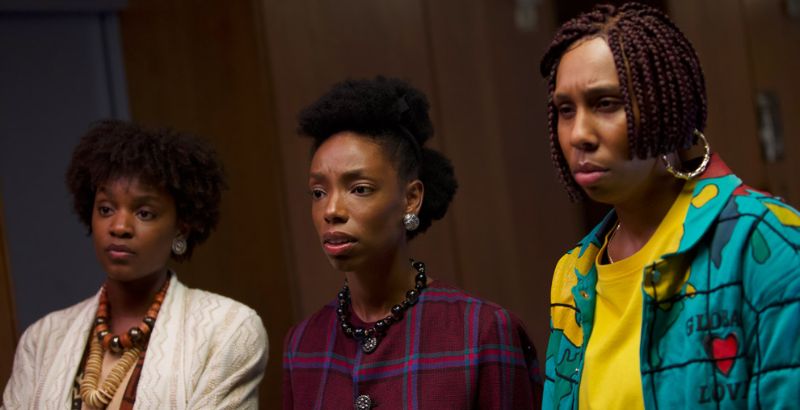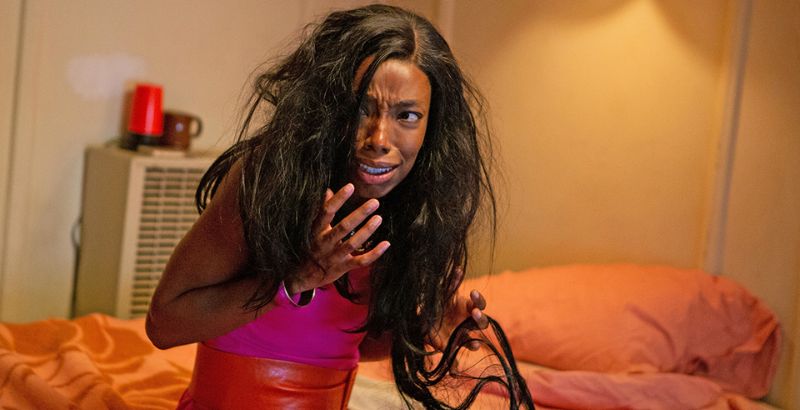
Writer and director Justin Simien’s second feature film, Bad Hair, is a horror comedy and satire in which a weave is a demonic sentient entity that opens up a new and attractive path to success, but with a dangerous and killer cost. But does its satire excuse the way it portrays Black women and our hair culture?
In the beginning, Bad Hair has the appearance of a film addressing the physical pain and emotional suffering Black girls and women go through to relax their hair, in order to fit in and be acceptable in a society where white, European-like features and attributes are most valued.
As I sat watching the film during a screening at the 2020 Sundance Film Festival, my emotions transformed from relatability with the lead character Anna Bludso (Elle Lorraine) to disappointment colored with rage. What began as social commentary about the pressures Black women are placed under to transform our hair – i.e. straighten it in order to better fit into white dominated spaces – turned into a scathing and rather insulting critique of Black women and our culture of protective styling. Simien implies that Black women turn into backstabbing villains willing to go to extreme measures just to have straight hair (and later braids).
Bad Hair implies that we don’t truly see, appreciate or support each other unless our hair is straight, whether it be through extensions or chemical and flat ironing methods. It also implies that having straight hair is a symbol of wealth, social/professional status, attitude and ambition. This is stereotyping, and this isn’t new for Simien. If you’ve ever watched Dear White People, the 2017 film or Netflix series, these specific tropes are easily recognizable.
In Dear White People, Black university students spend their time learning how to navigate their academic and personal lives, while coming into their own at a university where racial tensions are in constant flux. In the series, the characters all have their own defining idiosyncrasies and styles that make them distinct, but the women are actually divided into two sub-groups based on appearance. One set could be seen as the radical, liberal thinkers who are generally dressed in more relaxed clothing — that occasionally has some form of African print integrated — and their hair styled in braids and twists. The other set is more conservative, belongs to sororities, and speak in a more “cultured” manner, that is until they’re pissed off, giving great examples of code-switching. The latter group wear more “mature” and “sophisticated” clothing, and yes, you guessed it, weaves and wigs in long styles.
In analyzing Dear White People and Bad Hair, it becomes evident that Simien has some preconceived and negative notions about Black women, our hair, and how we feel about it. From the days when Black people were enslaved on plantations, through emancipation, the Harlem Renaissance, the Civil Rights Movement, to this current era, Black women of the diaspora have had a complicated relationship with our hair and how it has been viewed by non-Black people — particularly by white people. There were even Tignon laws during the 1700s prohibiting Black women from showing their natural hair in public.

After generations, we are again reclaiming and defining what is beautiful to us, starting with our crowning glory. Whether we wear weaves, braids, head wraps or have it blown out, it’s up to us to determine what we do with it, but when there are films and shows by Black people that portray protective styling as evil and something that makes us horrible monsters and eventually sellouts of our own race, that’s problematic.
Black women have always been the recipients of negative stereotyping; for the way we speak, the way we look and, and the way we wear our hair. And most of that stereotyping is pushed through white media due to either their ignorance or racist ideologies. For a Black creative to use these same misconceptions to poke fun at and misrepresent the why and how Black women wear weave, in such a horrific and painful manner, for the sake of satire only further stigmatizes us, and gives others the license to laugh at our expense .
It would seem that Simien’s intention was to parody the way Black women relate to and bond through our hair. Perhaps he intended to use parody as a method to show how we change behaviour and perspectives once we’ve gained the acceptance and attention of white people in positions of power by changing our appearance. This could have worked. It’s not like we don’t regularly poke fun at ourselves and shade each other for it, but there’s a certain sense of mean-spiritedness that underscores what happens on screen.
As a Black man, Simien should know better than to perpetuate portrayals that are harmful to Black women. In our culture, wearing weaves, be they straight, curly, long, or short, isn’t only about protecting our natural hair, it’s a form of self-expression. Black women have turned wearing weaves and wigs into an artform unto itself. This art acts as a visual representation for the way we feel, and allow us to experiment with different styles, without damaging the hair beneath. Simien should be aware that turning something we take so much pride in into something ugly and to be feared is harmful to us.
Can you imagine the questions that would be posed to us about what it’s really like to wear a weave? People seeing Bad Hair would believe that Simien, being part of the Black community must know what he’s talking about, so there has to be some truth to the fiction.
In showing the installation of weaves as torturous, Simien is reinforcing the same negative stereotypes that others view Black women by. Saying that Black women can’t belong to the upper echelons of society and laying the blame at Black women’s feet is dishonest, misleading, and harmful. Ironically, Simien has gained success for a show known for addressing the discrimination young Black people face in a society where white is inherently right, and class structures are framed and stringently reinforced, while the way the Black female characters are biasly coded based on their looks, seems to have been overlooked.

Following Sundance, Simien signed a deal with Hulu worth $8 million to have the film streamed on the international platform. As a Black woman, I’m sometimes caught between both rejoicing at the success of another Black people and being hesitant in my joy if the reason for that success is something that reflects negatively on us. To many, I’m sure Bad Hair is entertaining, and it was, at first, but I can’t be happy with a film that portrays Black women in the way this one does. Bad Hair is a film that not only says weaves are literally bad, it sends the message that Black women who wear weave hate themselves, and can’t be trusted because of it. Because of this, Bad Hair tells me the person sending this message needs to be the one educated, and not doing the educating.
With this film — and by extension, Dear White People — Simien had a great opportunity to show that Black women have had to cover our hair due to racism and the myriad of ways it affects us emotionally and mentally. The same way we use code-switching as a survival technique in certain spaces, is the same way Black women – and the characters in the film, use hair to create a shield. With Anna, there was the chance to explain that the pressure to conform and be accepted creates insecurities within us. I’m not saying that satire couldn’t be used to tell this story, quite the opposite.
For Black people, humor has always been used as a way to discuss difficult topics. We routinely poke fun at ourselves and shade each other for some of these things, while being cognizant of what the underlying issues are, and where certain ideas stem from. But rather than showing the emotional and mental anguish of having to do that, Simien mocked that, and turned it against us.
I don’t want to compare, but Bad Hair could’ve been for the Black femme community what Get Out out was for Black Americans and the diaspora as a whole. Instead, Simien used what could’ve been an effective tool of positive social commentary as one that shames and belittles the very people who need uplifting and protection.






